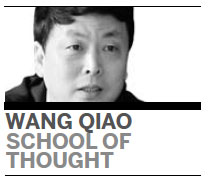Graduates of Jiangxi University of Finance and Economics are being snapped up by employers, a testament to the university's reputation and its ability to place former students into good positions, its president said.
The university, founded in 1923 in Jiangxi province, traditionally one of the country's less-developed areas, has maintained a graduate employment rate of more than 95 percent for three consecutive years.
The university was selected by the Ministry of Education in 2010 as one of the top 50 universities for placing graduates into good positions. Its efforts were also recognized by the State Council in 2012.
Wang Qiao, president of the university, said courses on career planning and job hunting are open to freshmen shortly after they enter the university, and making full use of the university's network has proved to be of immense benefit.
"In the past few decades, about 100, 000 students have graduated from our university."
After the financial crisis of 2008, when jobs were scarce, Wang penned hundreds of letters recommending students who were set to graduate in mid-2009.
Students from impoverished families are given travel expenses for job interviews out of Jiangxi province, and hundreds of job fairs are held on campus.
University Vice-President Yi Jiandong said they plan to organize 400 job fairs, offering 20,000 to 25,000 positions for graduates of 2014.
"It means that each of our graduates this year can, on average, have four posts to choose from," Yi said.

In addition to helping students hunt for jobs, the university also encourages and supports students to start their own business.
"To nurture more entrepreneurial talent that is honest, smart and persistent is also one of our goals," Wang said.
To achieve that goal, the university has hired more than 200 teachers who have wide experience in running programs that focus on challenges facing entrepreneurs.
More than 400 entrepreneurs, enterprise managers, government officials and experts from China and abroad have been invited to act as intern professors to give lectures and offer guidance to students.
In 2007, the university spent 27 million yuan ($4.34 million) on building a business innovation center, providing a base for students to turn their business ideas into practice. The center gives financial support to students who apply to start businesses there.
Businesses with registered capital of more than 100,000 yuan can receive a maximum of 30,000 yuan, while those with less than 100,000 yuan of registered capital can get 10,000 yuan.
Since 2008, more than 5,000 students have participated in starting and operating 120 enterprises at the center, in sectors including software development, management consulting, e-commerce, culture and communications. Generated profits have reached 16.37 million yuan.
Wang said that about 20 of the enterprises have moved out for further development. In addition, more than 300 of the university's graduates have set up their own businesses outside of the center.
"I'm glad to see that enterprises like to hire our graduates, and that an increasing number of our graduates have succeeded in starting and running their own business," Wang said.
"It not only indicates that society appreciates the knowledge and ability of our students but also that our ways of nurturing students are recognized."
Wang, a scholar of finance and economics himself, is not satisfied with just that.
"Our long-term goal is to make our university one of the leading ones, and to make that goal come true, we will attach greater importance to teaching quality and nurturing talent."
Q+A | Wang Qiao
What's the biggest change you made to Jiangxi University of Finance and Economics?
I have been the president of our university since September 2008. That year we made the university's 12th five-year plan, which focused on developing six aspects of our university with the hope of making it a prestigious one in China. The plan sets a clear goal for us to pursue, and we are now making efforts in six areas, including making our majors better, improving the quality of teaching, and raising the level of our scientific research.
What do you want to say to graduates of the university this year?
First, I hope the graduates of our university can do things in a down-to-earth way, and treat people honestly. Second, I hope they have the courage to accept an imperfect reality and improve the situation with their own strength. Third, be grateful to those who offer a hand when you are in trouble. Last but not least, I hope they can enjoy their lives and bear in mind that happiness is not necessarily connected with material well-being.
What will be your legacy?
I'm a graduate of Jiangxi University of Finance and Economics myself, and have been studying, living and working here for over 30 years. The university nurtured me, and I'm deeply grateful to it - just as a son is grateful to his mother - so I don't think what I have achieved is a legacy for the university. Instead, it's just my way to show thanks to my university for what it has done for me.
What kind of president do you want your students to remember you as?
I hope students remember me as a president who has the determination to reform and the spirit to innovate, and a president who would like to communicate and make friends with them. I will try my best to be a good teacher, a good friend and a good university leader, and make every effort to help students grow.
(China Daily 03/24/2014 page5)
